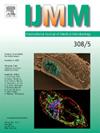Imipenem-induced outer membrane vesicles from Elizabethkingia anophelis inhibit biofilm formation and shift nosocomial pathogen dynamics
IF 3.6
3区 医学
Q1 MICROBIOLOGY
引用次数: 0
Abstract
Elizabethkingia anophelis is an emerging multidrug-resistant Gram-negative pathogen that can cause severe nosocomial infections. Although multidrug resistance complicates the clinical management of E. anophelis, the ecological impact of stress responses, including antibiotic pressure, is unclear. We demonstrated that exposure to sub-inhibitory concentrations of imipenem promoted the secretion of antibiotic-induced outer membrane vesicles (iOMVs) by E. anophelis. This study analyzed the physical and functional characteristics of iOMVs produced by a drug-resistant clinical isolate of E. anophelis treated with imipenem and assessed the potential of E. anophelis iOMVs to modulate biofilm formation in other clinically relevant Gram-negative bacteria. High-resolution imaging and biofilm assays showed that iOMVs inhibited biofilm formation and reduced biofilm density. The inhibitory effect did not affect other nosocomial pathogens such as Pseudomonas aeruginosa, Enterobacter cloacae, or Klebsiella pneumoniae. Imipenem-induced vesiculation may inadvertently impair E. anophelis’ biofilm resilience while altering microbial competition, reshaping survival dynamics in polymicrobial environments. These results demonstrate the paradoxical effect of antibiotic stress and suggest that vesicle-mediated interactions strongly affect nosocomial pathogen ecology.
亚胺培南诱导的依蚊外膜囊泡抑制生物膜形成并改变医院病原体动态
伊莉莎白按蚊是一种新兴的多重耐药革兰氏阴性病原体,可引起严重的医院感染。尽管多药耐药使按蚊的临床管理复杂化,但应激反应(包括抗生素压力)的生态影响尚不清楚。我们证明暴露于亚胺培南的亚抑制浓度促进了按蚊抗生素诱导的外膜囊泡(iOMVs)的分泌。本研究分析了经亚胺培南处理的耐药按蚊临床分离株产生的iomv的物理和功能特征,并评估了按蚊iomv调节其他临床相关革兰氏阴性菌生物膜形成的潜力。高分辨率成像和生物膜分析显示,iomv抑制生物膜的形成,降低生物膜密度。抑制效果不影响其他医院内的病原体,如铜绿假单胞菌、阴沟肠杆菌或肺炎克雷伯菌。亚胺培南诱导的囊泡可能无意中损害了按蚊的生物膜弹性,同时改变了微生物的竞争,重塑了多微生物环境中的生存动态。这些结果证明了抗生素应激的矛盾效应,并表明囊泡介导的相互作用强烈影响医院病原体生态。
本文章由计算机程序翻译,如有差异,请以英文原文为准。
求助全文
约1分钟内获得全文
求助全文
来源期刊
CiteScore
9.70
自引率
0.00%
发文量
18
审稿时长
45 days
期刊介绍:
Pathogen genome sequencing projects have provided a wealth of data that need to be set in context to pathogenicity and the outcome of infections. In addition, the interplay between a pathogen and its host cell has become increasingly important to understand and interfere with diseases caused by microbial pathogens. IJMM meets these needs by focussing on genome and proteome analyses, studies dealing with the molecular mechanisms of pathogenicity and the evolution of pathogenic agents, the interactions between pathogens and host cells ("cellular microbiology"), and molecular epidemiology. To help the reader keeping up with the rapidly evolving new findings in the field of medical microbiology, IJMM publishes original articles, case studies and topical, state-of-the-art mini-reviews in a well balanced fashion. All articles are strictly peer-reviewed. Important topics are reinforced by 2 special issues per year dedicated to a particular theme. Finally, at irregular intervals, current opinions on recent or future developments in medical microbiology are presented in an editorial section.

 求助内容:
求助内容: 应助结果提醒方式:
应助结果提醒方式:


